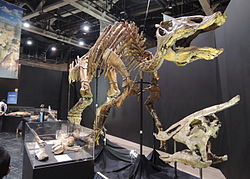Saurolophus
|
Saurolophus Temporal range: Maastrichtian, 70–68.5 Ma |
|
|---|---|
 |
|
| S. angustirostris skeleton and skull | |
| Scientific classification | |
| Kingdom: | Animalia |
| Phylum: | Chordata |
| Class: | Reptilia |
| Clade: | Dinosauria |
| Order: | †Ornithischia |
| Suborder: | †Ornithopoda |
| Family: | †Hadrosauridae |
| Subfamily: | †Saurolophinae |
| Tribe: | †Saurolophini |
| Genus: |
†Saurolophus Brown, 1912 |
| Type species | |
|
†Saurolophus osborni Brown, 1912 |
|
| Species | |
|
†S. osborni Brown, 1912 |
|
†S. osborni Brown, 1912
†S. angustirostris Rozhdestvensky, 1952
Saurolophus (/sɔːˈrɒləfəs/; meaning "lizard crest") is a genus of large saurolophine hadrosaurid dinosaurs that lived about 70.0–68.5 million years ago, in the Late Cretaceous of North America and Asia; it is one of the few genera of dinosaurs known from multiple continents. It is distinguished by a spike-like crest which projects up and back from the skull. Saurolophus was a herbivorous dinosaur which could move about either bipedally or quadrupedally.
The type species, S. osborni, was described by Barnum Brown in 1912 from Canadian fossils. A second valid species, S. angustirostris, is represented by numerous specimens from Mongolia, and was described by Anatoly Konstantinovich Rozhdestvensky.
Saurolophus is known from material including nearly complete skeletons, giving researchers a clear picture of its bony anatomy. S. osborni, the rarer Albertan species, was around 9.8 m (32 ft) long, with its skull 1.0 m (3.3 ft) long. Its weight is estimated at 1.9 tonnes (2.1 tons).S. angustirostris, the Mongolian species, was larger; the type skeleton is roughly 12 m (39 ft) long, and larger remains are reported. Aside from size, the two species are virtually identical, with differentiation hindered by lack of study.
...
Wikipedia
